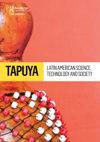通过与研究利益相关者的接触扩大知识转移领域:与行动研究的对话尝试
IF 1.2
Q2 HISTORY & PHILOSOPHY OF SCIENCE
Tapuya: Latin American Science, Technology and Society
Pub Date : 2023-09-15
DOI:10.1080/25729861.2023.2213596
引用次数: 0
摘要
许多知识转移研究分析了将知识从大学传递到产业和社会的渠道。行动研究已经成为一种同时产生和传递科学知识的方法;然而,知识转移研究很少采用行动研究,而行动研究也很少涉及知识转移这一主题。因此,很少有机会反思知识转移研究的对象与行动研究中体现的知识转移之间的界限。在此,我们提出了填补这一空白的第一个理论尝试,澄清了在行动研究中产生的交流空间中知识转移的维度,并为知识转移研究提供了经验教训。我们还通过采访该领域一些最有影响力的研究人员,对在知识转移研究中引入行动研究的适用性进行了反思。行动研究被认为是增加与研究利益相关者接触的一种方式,这是当前实现更高社会影响的需求所要求的。在知识转移研究中,参与被强调为关键概念的来源和对结果的改进解释。本文章由计算机程序翻译,如有差异,请以英文原文为准。
Enlarging the knowledge transfer realm through engagement with research stakeholders: a conversation attempt with action research
Many knowledge transfer studies analyze channels that carry knowledge from university to industry and society. Action research has become a method to produce and transfer scientific knowledge at the same time; however, knowledge transfer studies rarely employ action research, and action research has rarely addressed the topic of knowledge transfer. Hence, there have been few opportunities to reflect upon the boundaries between the object of knowledge transfer studies and the knowledge transfer embodied in action research. Here, we present a first theoretical attempt to fill this gap, clarifying the concepts at play and drawing lessons for knowledge transfer studies about the dimensions through which knowledge transfer occurs in the communicative space generated during action research. We also ground our reflections on the suitability of introducing action research in knowledge transfer studies by conducting interviews with some of the most influential researchers in the field. Action research is posited as a way to increase engagement with research stakeholders, as called for by current demands to achieve higher societal impact. Engagement is highlighted as a source of key concepts and improved interpretation of results in knowledge transfer studies.
求助全文
通过发布文献求助,成功后即可免费获取论文全文。
去求助
来源期刊

Tapuya: Latin American Science, Technology and Society
Social Sciences-Social Sciences (all)
CiteScore
1.60
自引率
0.00%
发文量
39
审稿时长
19 weeks
 求助内容:
求助内容: 应助结果提醒方式:
应助结果提醒方式:


